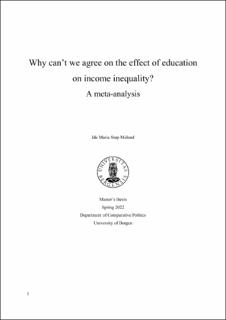Why can’t we agree on the effect of education on income inequality? A meta-analysis
Master thesis
Permanent lenke
https://hdl.handle.net/11250/3010936Utgivelsesdato
2022-06-22Metadata
Vis full innførselSamlinger
Sammendrag
Does education influence income inequality? Despite being a widely examined subject within political, sociological, and economic research over the past 70 years, researchers have not reached unanimity on whether higher levels of education lead to a decline in societal income inequality. This thesis contains a meta-analysis of existing research to investigate this relationship, reviewing 61 studies conducted between 1971 and 2020, with 917 individual estimates and approximately 71.500 datapoints. The results show that there has been a change in research findings on this topic over time, as recent research reports a stronger negative effect of education on national income inequality compared to research published more than 10 years ago. These findings are in line with the traditional hypothesis which holds that education has an equalizing effect. Additionally, primary education is found to have the strongest effect on income inequality, compared to other secondary- and tertiary education. There is no indication of publication bias within the selected research. Heterogeneity between the various studies from the past 50 years of research is in part explained by variation in study characteristics such as statistical framework, choice of conceptualization and measurements, and source of data. Researchers producing empirical research on the relationship between education and income inequality are advised to consider the revealed sources of heterogeneity from this study.
